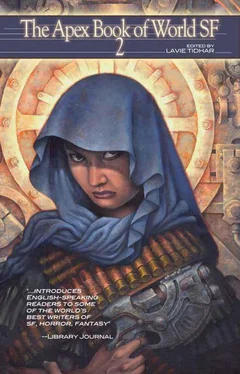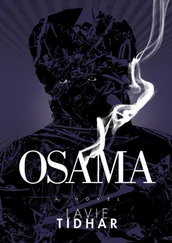“Love, my son, also comes from God.”
“Oh, it does, does it? Everybody here goes on about love, racking their brains where it comes from. Tristan and Iseult… Shall I tell you, shavling, where this love, or whatever it is, has come from? Shall I tell you what brought them together? It was me: Morholt. Before Tristan cracked my head, I poked him in the thigh and thus sent him to bed for several weeks. But he, the moment he felt a bit better, he dragged the lady of the Golden Hair into it. Any healthy man would do that, given time and opportunity. Later, the minstrels were singing about the Moren Wood and the naked sword. Balls, that’s what I say. Now you see yourself, monk, where the love comes from. Not from God, from Morholt. And it’s worth accordingly, this love. This maladie of yours.”
“You are blaspheming. You are talking about things you do not understand. And it would be better if you stopped talking about them.”
I didn’t punch him between the eyes with my tin mug, which I was squeezing in my hand. You wonder why? I’ll tell you why. Because he was right. I didn’t understand.
How could I understand? I was not conceived amidst misfortune, or born into tragedy. Flann and my mother conceived me on the hay and I’m sure they had plenty of good, healthy joy doing it. Giving me a name, they didn’t put any secret meanings into it. They gave me a name that it would be easy to call me by. “Morholt! Supper!” “Morholt! You little brat!” “Fetch some water, Morholt!” La tristesse? Balls, not la tristesse.
Can one daydream with a name like this? Play a harp? Devote all one’s thoughts to the beloved? Sacrifice to her all the matters of everyday life and pace the room unable to sleep? Balls. With a name like mine one can drink beer and wine and then puke under the table. Smash people’s noses. Crack heads with a sword or an axe or, alternatively, have it done to oneself. Love? Someone with the name Morholt pulls off a skirt, pokes his fill and falls asleep. Or, if he happens to feel a wee stirring in his soul, he will say: “Eh, ye’re a fine piece of arse, Maire O’Connell, I could gobble you whole, yer teats first.” Dig through it for three days and three nights, you won’t find in it a grain of la tristesse. Not a trace. So what, that I like looking at Branwen? I like looking at lots of things.
“Drink, monk. Pour it, don’t waste time. What are you mumbling?”
“It’s all in God’s hands, sicut in coelo et in terris , amen…”
“Maybe in coelo but not in terris, that’s for sure.”
“You are blaspheming, my son. Cave!”
“What are you trying to scare me with? A bolt from the blue?”
“I’m not trying to scare you. I fear for you. Rejecting God you reject hope. The hope that you won’t lose what you have won. The hope that when it comes to making a choice, you will make the right one. And that you won’t be left defenceless.”
“Life, with God or without God, with hope or without it, is a road without an end or beginning, a road that leads along the slippery side of a huge tin funnel. Most people don’t realise they are going round and round passing the same point on the narrow slippery slope of the circle. There are some who are unfortunate and slip. They fall. And that’s the end of them; they’ll never climb up, back to the edge; they won’t resume the march. They are sliding down, till they reach the bottom of the funnel, at the narrow point of the outlet where all meet. They meet, though only for a short while because further down, under the funnel, there awaits an abyss. This castle pounded by the waves is just such a place. The funnel’s outlet. Do you understand it, shavling?”
“No. But then I do not think you understand the cause behind my failure in understanding.”
“To hell with causes and effects, sicut in coelo et in terris. Drink, monk.”
We drank late into the night. The chaplain survived it admirably well. I didn’t do so well. I got pissed, I can tell you. I managed to drown… everything.
Or so it seemed to me.
Today the sea has the colour of lead. Today the sea is angry. I feel its anger and I respect it. I understand Branwen; I understand her fear. I don’t understand the cause. Or her words.
Today the castle is empty and terribly silent. Tristan is fighting the fever. Iseult and Branwen are at his side. I, Morholt of Ulster, stand on the battlements and look out into the sea.
Not a sign of a sail.
I was not asleep when she came in. And I was not surprised. It was as if I had expected it. That strange meeting on the beach, the journey through the dunes and salty meadows, the silly incident with Bec de Corbin and his friends, the evening by candlelight, the warmth of her body when I embraced her on the battlement, and above all that aura of love and death filling Carhaing—all this had brought us close to each other, bound us together. I even caught myself thinking that I would find it difficult to say goodbye…
To Branwen.
She didn’t say a word. She undid the brooch on her shoulder and let the heavy cloak drop onto the floor, and then quickly took off her shirt, a simple coarse garment, exactly like the ones worn everyday by Irish girls. She turned around, reddened by the flames flickering on the logs in the fire that was spying on her with its glowing eyes.
Also without saying a word, I moved to the side and made room for her next to me. She lay down, slowly, turning her face to me. I covered her with furs. We were both silent, lying still, watching the fleeting shadows on the ceiling.
“I couldn’t sleep,” she said. “The sea…”
“I know. I hear it, too.”
“I’m scared, Morholt.”
“I’m with you.”
“Please be.”
I embraced her as tenderly and delicately as I could. She slipped her arms round my neck and pressed her face to my cheek, overpowering me with her hot breath. I touched her gently, fighting the joyous urge to embrace her fully, the need for violent, lusty caress, just as if I were stroking a falcon’s feathers or the nostrils of a nervous horse. I stroked her hair, her neck and shoulders, her full, wonderfully rounded breasts with their small nipples. I stroked her hips which, not so long ago, seemed to me too round and that in fact were wonderfully round. I stroked her smooth thighs, her womanhood, that place I didn’t have a name for, for even in my thoughts I wouldn’t dare to name it as I used to, with any of the Irish, Welsh or Saxon words I knew. It would be like calling Stonehenge a pile of rubble, or Glastonbury Tor a hillock.
She trembled, giving herself forth to meet my hands, guiding them with the movements of her body. She asked, she demanded with groans, with rapid uneven gasps of breath. She pleaded with momentary submissions, warm and tender, only to harden the next moment into a quivering diamond.
“Love me, Morholt,” she whispered. “Love me.”
She was brave, greedy, impatient. But helpless and defenceless in my arms. She had to give in to my quiet, careful, restrained love. My love. The one I wanted. The one I wanted for her. For in the one she was trying to impose on me, I sensed fear, sacrifice, resignation, and I didn’t want her to be afraid, to sacrifice anything for me, to give up anything for me. I had my way.
Or so it seemed to me.
I felt the castle shudder in the slow rhythm of the pounding waves.
“Branwen…”
She pressed her hot body to mine; her sweat had the scent of wet feathers.
“Morholt… It’s good…”
“What’s good Branwen?”
“It’s good to live…”
We were silent for a long while. And then I asked a question. The question I shouldn’t have asked.
“Branwen… Will she… Will Iseult come here from Tintagel?”
Читать дальше












